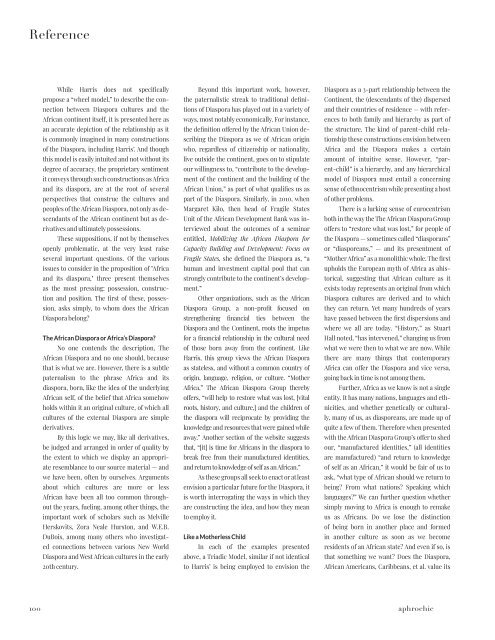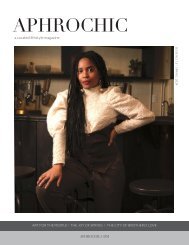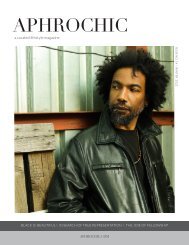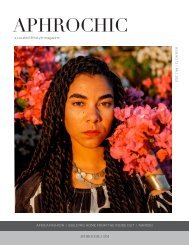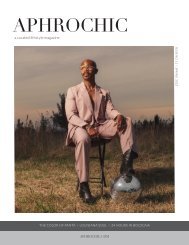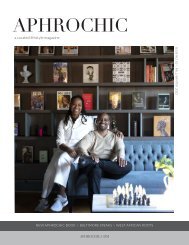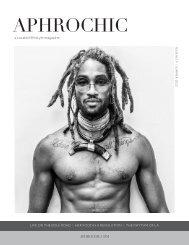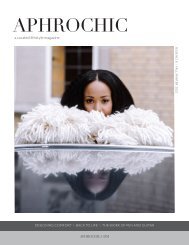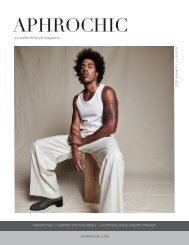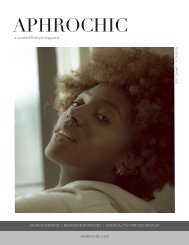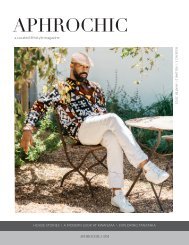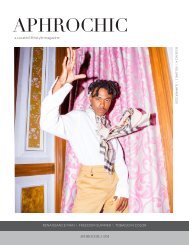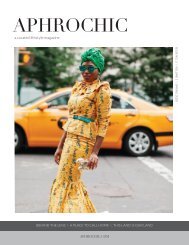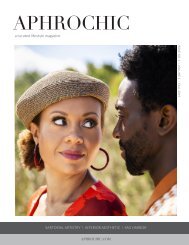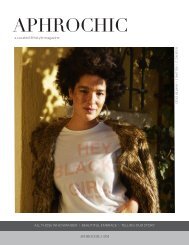AphroChic Magazine: Issue No. 12
Create successful ePaper yourself
Turn your PDF publications into a flip-book with our unique Google optimized e-Paper software.
Reference<br />
While Harris does not specifically<br />
propose a “wheel model,” to describe the connection<br />
between Diaspora cultures and the<br />
African continent itself, it is presented here as<br />
an accurate depiction of the relationship as it<br />
is commonly imagined in many constructions<br />
of the Diaspora, including Harris’. And though<br />
this model is easily intuited and not without its<br />
degree of accuracy, the proprietary sentiment<br />
it conveys through such constructions as Africa<br />
and its diaspora, are at the root of several<br />
perspectives that construe the cultures and<br />
peoples of the African Diaspora, not only as descendants<br />
of the African continent but as derivatives<br />
and ultimately possessions.<br />
These suppositions, if not by themselves<br />
openly problematic, at the very least raise<br />
several important questions. Of the various<br />
issues to consider in the proposition of "Africa<br />
and its diaspora," three present themselves<br />
as the most pressing: possession, construction<br />
and position. The first of these, possession,<br />
asks simply, to whom does the African<br />
Diaspora belong?<br />
The African Diaspora or Africa’s Diaspora?<br />
<strong>No</strong> one contends the description, The<br />
African Diaspora and no one should, because<br />
that is what we are. However, there is a subtle<br />
paternalism to the phrase Africa and its<br />
diaspora, born, like the idea of the underlying<br />
African self, of the belief that Africa somehow<br />
holds within it an original culture, of which all<br />
cultures of the external Diaspora are simple<br />
derivatives.<br />
By this logic we may, like all derivatives,<br />
be judged and arranged in order of quality by<br />
the extent to which we display an appropriate<br />
resemblance to our source material — and<br />
we have been, often by ourselves. Arguments<br />
about which cultures are more or less<br />
African have been all too common throughout<br />
the years, fueling, among other things, the<br />
important work of scholars such as Melville<br />
Herskovits, Zora Neale Hurston, and W.E.B.<br />
DuBois, among many others who investigated<br />
connections between various New World<br />
Diaspora and West African cultures in the early<br />
20th century.<br />
Beyond this important work, however,<br />
the paternalistic streak to traditional definitions<br />
of Diaspora has played out in a variety of<br />
ways, most notably economically. For instance,<br />
the definition offered by the African Union describing<br />
the Diaspora as we of African origin<br />
who, regardless of citizenship or nationality,<br />
live outside the continent, goes on to stipulate<br />
our willingness to, “contribute to the development<br />
of the continent and the building of the<br />
African Union,” as part of what qualifies us as<br />
part of the Diaspora. Similarly, in 2010, when<br />
Margaret Kilo, then head of Fragile States<br />
Unit of the African Development Bank was interviewed<br />
about the outcomes of a seminar<br />
entitled, Mobilizing the African Diaspora for<br />
Capacity Building and Development: Focus on<br />
Fragile States, she defined the Diaspora as, “a<br />
human and investment capital pool that can<br />
strongly contribute to the continent’s development.”<br />
Other organizations, such as the African<br />
Diaspora Group, a non-profit focused on<br />
strengthening financial ties between the<br />
Diaspora and the Continent, roots the impetus<br />
for a financial relationship in the cultural need<br />
of those born away from the continent. Like<br />
Harris, this group views the African Diaspora<br />
as stateless, and without a common country of<br />
origin, language, religion, or culture. “Mother<br />
Africa,” The African Diaspora Group thereby<br />
offers, “will help to restore what was lost, [vital<br />
roots, history, and culture,] and the children of<br />
the diaspora will reciprocate by providing the<br />
knowledge and resources that were gained while<br />
away.” Another section of the website suggests<br />
that, “[it] is time for Africans in the diaspora to<br />
break free from their manufactured identities,<br />
and return to knowledge of self as an African.”<br />
As these groups all seek to enact or at least<br />
envision a particular future for the Diaspora, it<br />
is worth interrogating the ways in which they<br />
are constructing the idea, and how they mean<br />
to employ it.<br />
Like a Motherless Child<br />
In each of the examples presented<br />
above, a Triadic Model, similar if not identical<br />
to Harris’ is being employed to envision the<br />
Diaspora as a 3-part relationship between the<br />
Continent, the (descendants of the) dispersed<br />
and their countries of residence — with references<br />
to both family and hierarchy as part of<br />
the structure. The kind of parent-child relationship<br />
these constructions envision between<br />
Africa and the Diaspora makes a certain<br />
amount of intuitive sense. However, “parent-child”<br />
is a hierarchy, and any hierarchical<br />
model of Diaspora must entail a concerning<br />
sense of ethnocentrism while presenting a host<br />
of other problems.<br />
There is a lurking sense of eurocentrism<br />
both in the way the The African Diaspora Group<br />
offers to “restore what was lost,” for people of<br />
the Diaspora — sometimes called “diasporans”<br />
or “diasporeans,” — and its presentment of<br />
“Mother Africa” as a monolithic whole. The first<br />
upholds the European myth of Africa as ahistorical,<br />
suggesting that African culture as it<br />
exists today represents an original from which<br />
Diaspora cultures are derived and to which<br />
they can return. Yet many hundreds of years<br />
have passed between the first dispersions and<br />
where we all are today. “History,” as Stuart<br />
Hall noted, “has intervened,” changing us from<br />
what we were then to what we are now. While<br />
there are many things that contemporary<br />
Africa can offer the Diaspora and vice versa,<br />
going back in time is not among them.<br />
Further, Africa as we know is not a single<br />
entity. It has many nations, languages and ethnicities,<br />
and whether genetically or culturally,<br />
many of us, as diasporeans, are made up of<br />
quite a few of them. Therefore when presented<br />
with the African Diaspora Group’s offer to shed<br />
our, “manufactured identities,” (all identities<br />
are manufactured) “and return to knowledge<br />
of self as an African,” it would be fair of us to<br />
ask, “what type of African should we return to<br />
being? From what nations? Speaking which<br />
languages?” We can further question whether<br />
simply moving to Africa is enough to remake<br />
us as Africans. Do we lose the distinction<br />
of being born in another place and formed<br />
in another culture as soon as we become<br />
residents of an African state? And even if so, is<br />
that something we want? Does the Diaspora,<br />
African Americans, Caribbeans, et al. value its<br />
100 aphrochic


